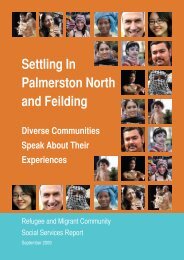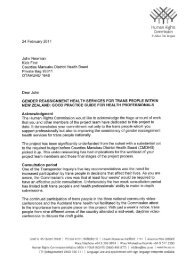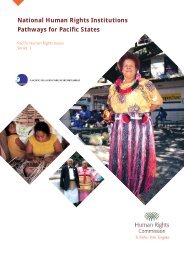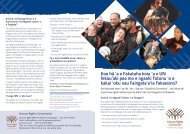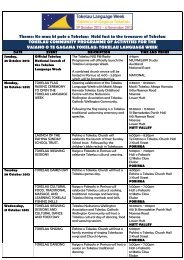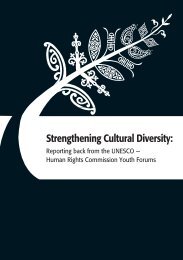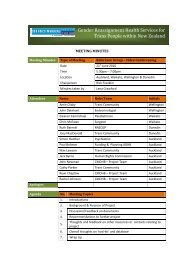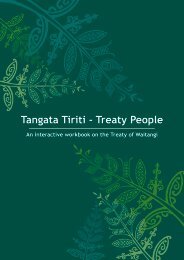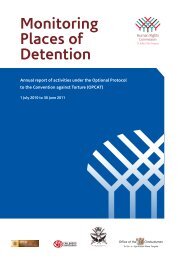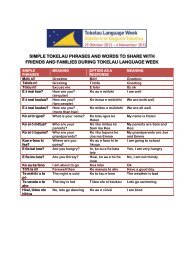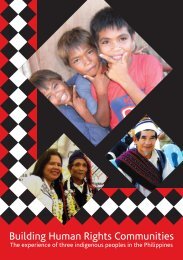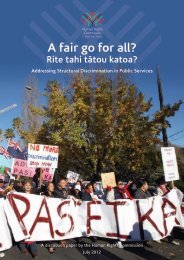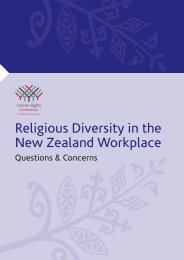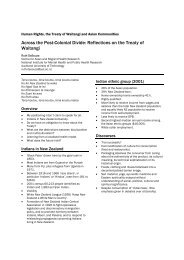14 HUMAN RIGHTS COMMISSION | STATEMENT OF INTENTOutcome area two:Housing, health and communityOutcomeInclusion and participation achieved through all people inNew Zealand having access <strong>to</strong> healthy housing, the highestattainable level <strong>of</strong> health and wellbeing, and accessibilityconsistent with the Convention on the <strong>Rights</strong> <strong>of</strong> Personswith Disabilities.Situation analysisAffordable, habitable housing remains a challenge forNew Zealand as a whole, with a concentration <strong>of</strong> housingissues in Auckland. Inequalities experienced by peoplein terms <strong>of</strong> health, housing and accessibility within thecommunity are particularly acute for those people affectedby the Canterbury earthquakes. It is essential that lessonsand gains made in Canterbury regarding habitable andaffordable housing are transferred <strong>to</strong> other parts <strong>of</strong> NewZealand in the future.The Canterbury earthquakes have triggered challenges <strong>to</strong>the realisation <strong>of</strong> a number <strong>of</strong> economic and social rights,including the rights <strong>to</strong> housing, an adequate standard<strong>of</strong> living, health and education. Civil and political rightshave also been challenged. These challenges are acutefor those who were already experiencing disadvantageand discrimination in the pre-disaster context, particularlypeople with disabilities, cultural minorities, and childrenand young people. Many people face uncertaintyover accommodation, work and business prospectsas a consequence <strong>of</strong> the earthquakes. In post-disastersituations, human rights standards are part <strong>of</strong> the essentialfoundation for a fair and just recovery.A coordinated focus on the psychosocial recovery <strong>of</strong>Canterbury remains one <strong>of</strong> New Zealand’s most pressinghuman rights issues and is much needed. Repeatedexposure <strong>to</strong> trauma through the major earthquakesand repeated aftershocks has resulted in chronic stressand psychosocial harm for many Cantabrians, showingin high rates <strong>of</strong> anti-depressant medication use andpeople presenting <strong>to</strong> mental health facilities, communitydislocation, and anti-social behaviour. Deterioration inmental health and wellbeing amongst young people isparticularly concerning.<strong>Human</strong> rights don’t disappear the momentan earthquake, a hurricane or a tsunamistrikes. We witnessed after the IndianOcean tsunami, the earthquake in Haiti andmany other disaster situations that duringrelief and recovery efforts the protection <strong>of</strong>human rights gains in importance as it cansafeguard the dignity <strong>of</strong> those affected.United Nations Inter-Agency Standing Committee (2011)Operational Guidelines on the Protection <strong>of</strong> Persons inSituations <strong>of</strong> Natural DisastersInternational human rights standardsThe international human rights standards underpinning thisoutcome area are the:1 guidelines produced by the Inter-Agency StandingCommittee (IASC), established by a UN GeneralAssembly resolution in 1991, <strong>to</strong> bring <strong>to</strong>getherinternational organisations working <strong>to</strong> providehumanitarian assistance <strong>to</strong> people in need as a result <strong>of</strong>natural disasters, conflict-related emergencies, globalfood crises and pandemics2 Convention on the <strong>Rights</strong> <strong>of</strong> Persons with Disabilities(Disability Convention)3 International Covenant on Civil and Political <strong>Rights</strong>(ICCPR)4 International Covenant on Economic, Social andCultural <strong>Rights</strong> (ICESCR).The right <strong>to</strong> property is <strong>of</strong> significance in terms <strong>of</strong> theCanterbury earthquake recovery. Article 17 <strong>of</strong> the UniversalDeclaration <strong>of</strong> <strong>Human</strong> <strong>Rights</strong> states:1 Everyone has the right <strong>to</strong> own property alone as well asin association with others.2 No-one shall be arbitrarily deprived <strong>of</strong> his property.Housing affordability, habitability and property rightsare core human rights concerns arising in the Canterburyearthquake recovery. A lack <strong>of</strong> participation in decision-
HUMAN RIGHTS COMMISSION | STATEMENT OF INTENT15making processes about housing, insurance and communitydislocation compound the psychosocial stress experiencedby Canterbury residents. Many are unable <strong>to</strong> move on withtheir lives while they navigate complex insurance assessmentand repair processes, and are largely left out <strong>of</strong> problemidentification and solution design processes. In manyinstances, they are struggling <strong>to</strong> access the informationrequired <strong>to</strong> be able <strong>to</strong> make important decisions.The current housing shortage has been exacerbated by a loss<strong>of</strong> social housing. This is affecting migrant workers arrivingfor the rebuild, families in need <strong>of</strong> temporary housing, andrenters. The Government has acknowledged the rebuild<strong>of</strong> Christchurch is an opportunity <strong>to</strong> make the city moreaccessible, safer, easier <strong>to</strong> navigate and also <strong>to</strong> have moreaccessible housing. In <strong>2013</strong>–14, planned governmentinitiatives are focused on promoting accessible housing.Lessons from the Canterbury recovery will prove useful<strong>to</strong> achieving improved outcomes more widely for peopleacross New Zealand in terms <strong>of</strong> housing, health andaccessibility within the community.What we will doWe are committed <strong>to</strong> working with the people <strong>of</strong>Canterbury, government and non-government agencies,tangata whenua, local authorities and business <strong>to</strong> ensurethat people affected by the Canterbury earthquakesexperience health and wellbeing equal <strong>to</strong>, or better than,international norms in post-disaster recovery, and thatthe Government’s goal <strong>of</strong> making Christchurch the world’smost accessible city is realised.The focus <strong>of</strong> our work will be <strong>to</strong> promote the primacy <strong>of</strong>a human rights approach <strong>to</strong> the Canterbury earthquakerecovery and <strong>to</strong> replicate lessons learnt elsewhere in NewZealand, particularly in decile 1–3 economic areas.We will continue <strong>to</strong> engage with and provide advice <strong>to</strong>central and local government on adopting a human rightsapproach <strong>to</strong> address systemic issues in the development<strong>of</strong> policies and practices. We will provide advocacy andadvice on issues related <strong>to</strong> the recovery for vulnerablecommunities and civil society organisations.We will continue involvement in the development <strong>of</strong>an internationally benchmarked moni<strong>to</strong>ring frameworkthat will work <strong>to</strong> ensure the recovery is inclusive, nondiscrimina<strong>to</strong>ryand meets international best practice.Over time, we intend <strong>to</strong> leverage what we learn from ourfocus on improving outcomes <strong>of</strong> the people most affectedby the Canterbury earthquakes <strong>to</strong> identify what activitieswe might replicate more widely across New Zealand incontribution <strong>to</strong> achieving improved outcomes for the widerNew Zealand population.During <strong>2013</strong>–14, we will:1 advocate for the informing <strong>of</strong> policy-makers andservice providers about psychosocial harm arising out<strong>of</strong> the aftermath <strong>of</strong> the earthquakes, and advocatefor government agencies, civil society and business <strong>to</strong>ensure psychosocial harm is reduced2 advocate for more inclusive services and supportmechanisms <strong>to</strong> improve the wellbeing and whänau ora<strong>of</strong> people living in Canterbury3 facilitate dialogue between key influencers anddecision-makers with affected and vulnerable people <strong>to</strong>ensure their participation in post-earthquake problemdefinition, solution-design and decision-making4 advocate for a human rights approach <strong>to</strong> influencetechnical and legal frameworks on building design,land use and recovery, and accessibility <strong>of</strong> the builtenvironment in Canterbury <strong>to</strong> support human rightsoutcomes5 inform decision-makers on the economics <strong>of</strong>affordable, accessible and healthy housing inCanterbury.Who we will work withOur partners in the moni<strong>to</strong>ring framework include theOffice <strong>of</strong> the Ombudsman, the Office <strong>of</strong> the Audi<strong>to</strong>r-General, the Insurance and Savings Ombudsman, and theSerious Fraud Office. We will maintain our membership<strong>of</strong> The Earthquake Disability Leadership Group andcontinue <strong>to</strong> engage with the business sec<strong>to</strong>r – focusing onthe insurance, banking and property areas – <strong>to</strong> build anunderstanding <strong>of</strong> the human rights implications <strong>of</strong> theiractivities in the recovery context. We will also continue<strong>to</strong> build meaningful relationships with affected people,connecting them with decision-makers and influencers aspart <strong>of</strong> a solutions-focused, citizen-centred approach <strong>to</strong>improving human rights outcomes.



